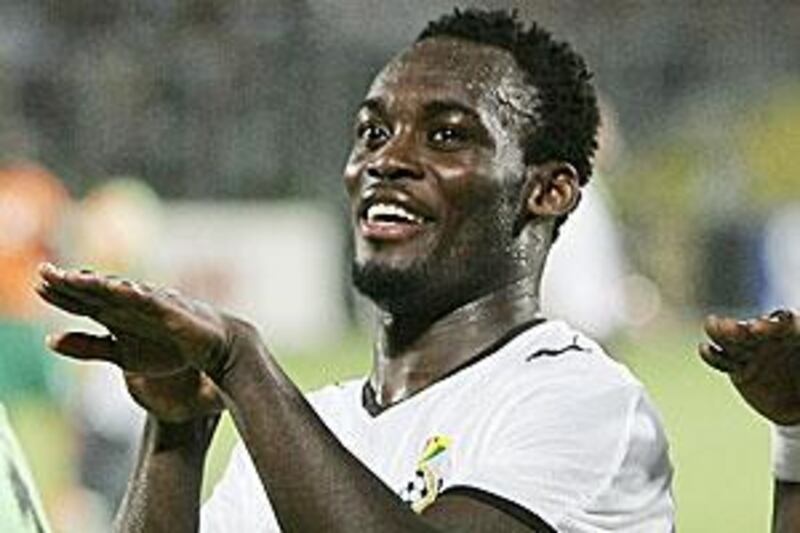LUANDA // Already a shadow has been cast over what should have been the greatest year in African sporting history. The journey to Soccer City in Johannesburg, where the World Cup final will be played on July 11, should have got under way with the opening game of the African Cup of Nations between Angola and Mali this evening.
However, whatever happens in the next six months will be tainted by the events of Friday, when gunmen opened fire on the Togo team bus in Cabinda. The Confederation African de Football (CAF) is determined the tournament should go ahead, but it is hard to imagine anybody will go to the Estadio 11 de Novembro tonight with their minds focused fully on football. The mood of African affirmation has been shattered.
Fabrice Akwa, Angola's former captain, has repeatedly spoken of how football can help remind people that Angola is about more than "oil, war and poverty". The attacks, by a separatist group angered by the distribution of oil revenues, have sadly - perhaps even accurately - reinforced that image. Having decided to press ahead with the tournament, CAF's job is now to shift the focus back to football, and if the sport can be taken in isolation, then the openness of the competition bodes well.
"Things are changing in Africa," said the former Ghana great Abedi Pele, who now serves on Fifa's technical committee. "You are seeing African players at all the top clubs in Europe and the organisation is improving. "The fact that it's not just the same four or five countries qualifying all the time shows there is a greater depth to the talent than ever before." Egypt, who will be aiming for an unprecedented third successive title, are the most notable African absentees from the World Cup, and may feel they have some scores to settle, but inevitably most of the attention will settle on those sides who are going to South Africa.
Ivory Coast, blessed with one of the greatest generations of players ever produced by an African nation, are favourites, but they were less than impressive in beating Tanzania 1-0 in a friendly last Monday, with their coach, Vahid Halilhodzic, admitting he is concerned that his England-based players could be facing burn-out. They also perhaps hear the ticking of the clock, because the squad is reaching maturity but so far has won nothing, losing in the semi- final two years ago and the final two years before that.
"We go to the Nations Cup with great ambition like Cameroon, Egypt, Nigeria and even Ghana," Halilhodzic said. "We cannot hide. We have great status that must be maintained." His caution over Ghana is justified. When they were drawn in the same group as Ivory Coast, there were spontaneous gasps around the auditorium, but since then Ghana have been struck by a series of problems. Most notably, there are the injuries which have deprived them of midfielders Stephen Appiah and Laryea Kinsgton and the defenders John Mensah and John Pantsil, while leaving Michael Essien, Anthony Annan and Asamoah Gyan doubtful for tomorrow's opener against Togo.
But they are also without Inter Milan's Sulley Muntari, who was expelled from the squad after failing to show for a friendly against Angola in November, a decision that prompted Essien to write an open letter of protest to the Ghana Football Association. There were further indications of discontent when Ghana arrived late for a friendly against Malawi last week as players insisted a dispute over bonuses be settled before leaving their training camp in South Africa.
Cameroon, perhaps, provide the main threat to Ivory Coast. Four consecutive victories in the qualifiers after Paul Le Guen took over last June have raised morale, and suggested they are nearing the sort of defensive organisation that, allied to the goals of Samuel Eto'o, makes them a dangerous prospect. "We realised we'd become lackadaisical and needed to work harder and really strive to win every single game," said Achille Webo, the Real Mallorca forward whom Le Guen has restored as the partner for Eto'o.
Egypt, of course, expect to challenge and face their first test on Tuesday when they meet Nigeria, the great enigmas of African football. The Nigerian Football Federation has set their coach, Shuaibu Amodu, a target of reaching the semi-final if he is to keep his job through to the World Cup. Whatever happens, though, this tournament will always be remembered for Friday's attacks. Much is said about football's power to heal and to bring people together, but it is not omnipotent.
@Email:sports@thenational.ae





